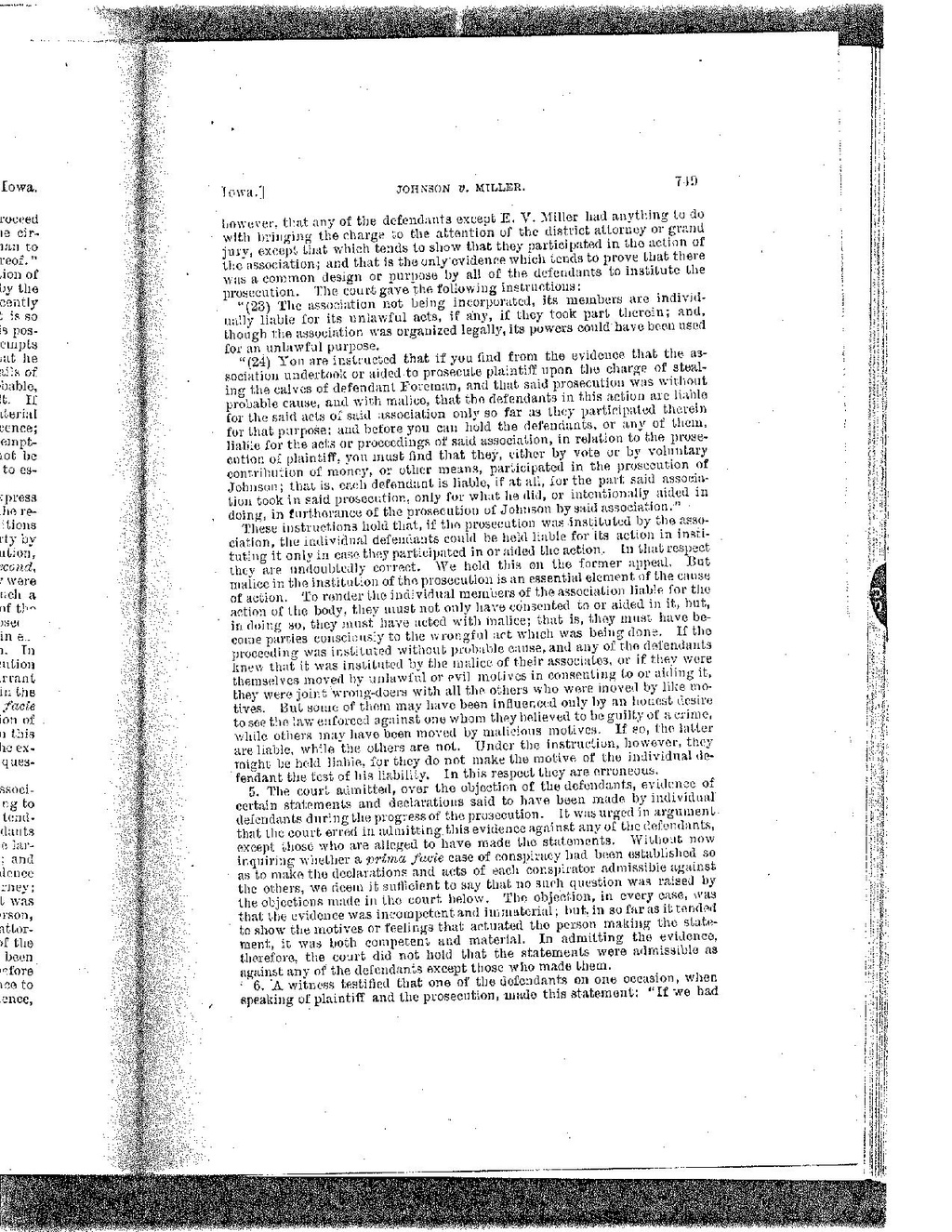however, that any of the defendants except E. V. Miller had anything to do with bringing the charge to the attention of the district attorney or grand jury, except that which tends to show that they participated in the action of the association; and that is the only evidence which tends to prove that there was a common design or purpose by all of the defendants to institute the prosecution. The court gave the following instructions:
"(23) The association not being incorporated, its members are individually liable for its unlawful acts, if any, if they took part therein: and though the association was organized legally, its powers could have been used for an unlawful purpose.
"(24) You are instructed that if you find from the evidence that the association undertook or aided to prosecute plaintiff upon the charge of stealing the calves of defendant Foreman, and that said prosecution was without probable cause, and with malice, that the defendants in this action are liable for the said acts of said association only so far as they participated therein for that purpose: and before you can hold the defendants, or any of them, liable for the acts or proceedings of said association, in relation to the prosecution of plaintiff, you must find that they, either by vote or by voluntary contribution of money, or other means, participated in the prosecution of Johnson; that is, each defendant is liable, if at all, for the part said association took in said prosecution, only for what he did, or intentionally aided in doing, in furtherance of the prosecution of Johnson by said association."
These instructions hold that, if the prosecution was instituted by the association, the individual defendants could be held liable for its action in instituting it only in case they participated in or aided the action. In that respect they are undoubtedly correct. We held this on the former appeal. But malice in the institution of the prosecution is an essential element of the cause of action. To render the individual members of the association liable for the action of the body. they must not only have consented to or aided in it, but, in doing so, they must have acted with malice; that is, they must have become parties consciously to the wrongful act which was being done. If the proceeding was instituted without probable cause, and any of the defendants knew that it was instituted by the malice of their associates, or if: they were themselves moved by unlawful or evil motives in consenting to or aiding it, they were joint "wrong:-doers with all the others who were moved by like motives. But some of them may have been influenced only by an honest desire to see the law enforced against one whom they believed to be guilty of a crime. while others may have been moved by malicious motives. If so, the hitter are liable, while the others are not. Under the instruction, however, they might be held liable, for they do not make the motive of the individual defendant the test of his liability. In this respect they are erroneous.
5. The court admitted, over the objection of the defendants, evidence of certain statements and declarations said to have been made by individual defendants during the progress of the prosecution. It was urged in argument that the court erred in admitting this evidence against any of the defendants, except those who are alleged to have made the statements. Without now inquiring whether a prima facie case of conspiracy had been established so as to make the declarations and acts of each conspirator admissible against the others, we deem it sufficient to say that no such question was raised by the objections made in the court below. The objection, in every case, was that the evidence was incompetent and immaterial but, in so far as it tended to show the motives or feelings that actuated the person making the statement, it was both competent and material. In admitting the evidence, therefore, the court did not hold that the statements were admissible as against any of the defendants except those who made them.
6. A witness testified that one of the defendants on one occasion, when speaking of plaintiff and the prosecution, made this statement: "If we had

